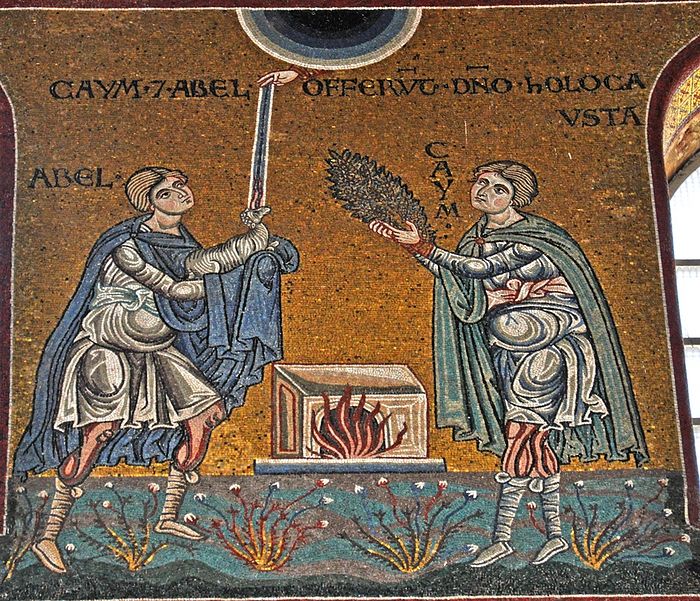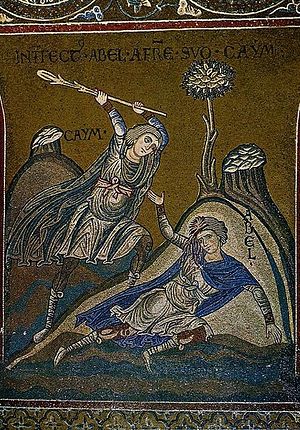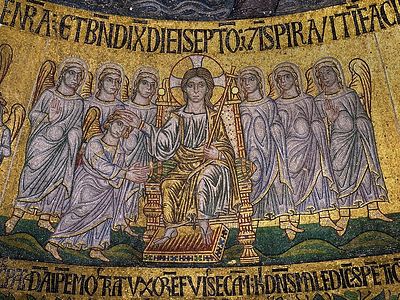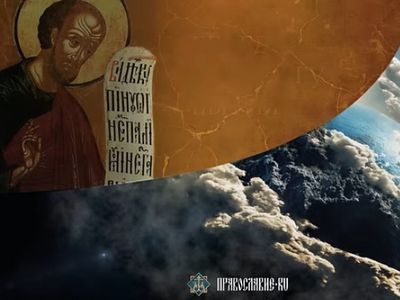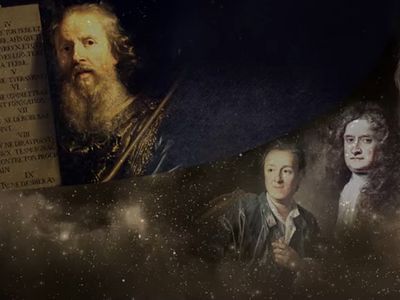When was the first Gospel proclaimed? Is a good cause always good? Why did God reject Cain’s sacrifice? What does the Lord’s question “Where is thy brother?” mean? Why did Cain build a city? Andrei Ivanovich Solodkov talks about these questions.
Dear readers! We are continuing our talks on the book of Genesis. The subject of today’s meeting is, “Is any service pleasing to God?” We will read the fourth chapter of this book of Holy Scripture which narrates the story of Cain and Abel. But before we start examining this chapter, let us now finish the analysis of the third chapter that we read at our previous meeting, whose subject was “Why does God allow evil?”
“Not me, but someone else”
(Gen. 3:10-24)
We ended the analysis of the third chapter on the ninth verse: And the Lord God called unto Adam, and said unto him, Where art thou? We now read further:
And he said, I heard thy voice in the garden, and I was afraid, because I was naked; and I hid myself. And he said, Who told thee that thou wast naked? Hast thou eaten of the tree, whereof I commanded thee that thou shouldest not eat? And the man said, The woman whom thou gavest to be with me, she gave me of the tree, and I did eat. And the Lord God said unto the woman, What is this that thou hast done? And the woman said, The serpent beguiled me, and I did eat (Gen. 3:10-13).
Such a familiar picture from our modern life! And today similar situations abound. Someone is asked, “Why did you do that?” And he answers: “It’s not my fault. Someone else is to blame.” Then that other person is asked: “And why did you do it?” And the latter replies: “It’s not me! So and so gave me the idea.” And it is not uncommon to see the following situation: a person comes to confession and tells the priest, for example, that he used foul language because after eleven o’clock at night his neighbors started beating on the wall, so he lost his temper and sinned. And in each case “someone else” is guilty, but not the person himself. It’s really like kindergarten! “Peter, why did you break the vase?” “Because Mary shoved me!” and the like. You’ll never find out who is guilty. Nothing has changed in human nature! And today we observe the same things that were occurring at the Fall of man.
The Lord called upon Adam and asked him: Where art thou? But His question was by no means a reproach—it was a call for repentance. Where art thou? means “what state are you in now?” And Adam replied: The woman whom thou gavest to be with me, she gave me of the tree… And then God spoke to Eve: What is this that thou hast done? Brothers and sisters, let us pay attention to one important moment. We see that the woman was the first to speak to the devil, thus violating the hierarchy of family relations. But it was not Eve who the Lord addressed first (later the apostle Paul wrote that Eve was responsible for the sin), but Adam. Why? I will repeat myself: because Adam was head of the family. The head of the family always bears the prime responsibility. And what does it mean to be the head of the family? It does not mean being a despot or tyrant, but a sober-minded and wise leader. The head is one who heeds the Divine voice and edifies his wife and children. It means applying the principle of Christian family life: the husband is the head of a family, the wife is a helper, and children are obedient.
And what did the woman say in reply: “I’m not to blame. The serpent is guilty.” This is all the same—you’ll never find out who’s guilty. Today people answer the same way. These are the most widespread questions of our days: why does God allow evil? Why does evil exist in this world? Why doesn’t God put things in order? But people are unwilling to see this lack of balance in themselves which is a result of their lapse from God.
However, although man broke his vital relation with God by transgressing the commandment, the Creator did not leave him alone.
And further we read the words addressed by God to the serpent:
And I will put enmity between thee and the woman, and between thy seed and her seed; it shall bruise thy head, and thou shalt bruise his heel (Gen. 3:15).
The first Gospel is proclaimed here. And it is the true Gospel, the good news that God will not abandon man, that the Son of God will come and strike the devil’s head; both the Mother of God and the Virgin Birth are mentioned here too, which was later confirmed by the holy prophet Isaiah: Therefore the Lord himself shall give you a sign; Behold, a virgin shall conceive, and bear a son, and shall call his name Immanuel (Isa. 7:14); and the name “Immanuel” means “God with us.” This prophecy was announced 700 years before the birth of Christ. The word “almah” is used here in the Bible in Hebrew, which means “a virgin.” When we study other books of Holy Scripture we will see that the word “almah” never refers simply to a woman or a young maiden, but always to a virgin. We are aware of the history of this text. When the righteous Symeon the God-Receiver was translating books of the Old Testament from Hebrew into Greek, he decided to erase this word, according to human reason: “If she is a virgin, then how can she give birth? Only women can bear children.” But an angel of God stopped him. And we know that this righteous man reached a great age and lived to see the infant Christ Who was brought to him. And, as we well know, he then exclaimed: Lord, now lettest thou thy servant depart in peace, according to thy word.
But this prophecy is uttered for the first time already in the book of Genesis, when the Lord said to the serpent: And I will put enmity between thee and the woman, and between thy seed and her seed.” But a woman cannot have seed, so He means here the Virgin Birth; shall bruise thy head…—and, indeed, Christ struck the devil’s head on the Cross of Golgotha; and thou shalt bruise his heel—it means that up to the Second Coming of Christ man will have an inclination towards sin. In other words, human nature is already healed, but before the Last Judgment our eternal destiny will depend on our faith and the deeds we perform in this temporal life.
Then the third chapter of Genesis tells us that the first people were banished from Paradise—from the world of abundant prosperity, complete wellbeing and utter happiness that had been given to them in the garden of Eden. And a mighty cherubim with a flaming sword was stationed to guard the way to Tree of Eternal Life. Why? As I said at our previous meeting, it was done to prevent man from immortalizing evil and becoming steeped in sin, that he would seek repentance.
Unto thee shall be his desire
(Gen. 4:1-24)
Now we come to the actual subject of today’s meeting: is any service pleasing to God? The following words belong to St. Symeon the New Theologian, “The good done in a not good way is not good.” What does it mean? It may seem to be a cavil: after all, the person did good, and as they say: “work done, have fun.” But, it is not so. It is said: the good done in a not good way is not good. This is very vividly illustrated in the Biblical narration about the two brothers, children of Adam and Eve, Cain and Abel.
We read:
And Adam knew Eve his wife; and she conceived, and bare Cain, and said, I have gotten a man from the Lord (Gen. 4:1).
It’s a very interesting verse. Recall again the good news that we read in the third chapter of Genesis, the words of God addressed to the serpent: And I will put enmity between thee and the woman, and between thy seed and her seed; it shall bruise thy head, and thou shalt bruise his heel (Gen. 3:15). For the devil, these words were like a death sentence, but for Adam and Eve, they were good tidings. As Apostle Paul put it, the Gospel is a sweet savor of Christ, in them that are saved, and in them that perish: …the savor of death unto death (see 2 Cor. 2:15-16). And Eve remembered this promise of God, this good news, and, having given birth to Cain, said: I have gotten a man from the Lord. However, she “got ahead of herself,” for she gave birth not to the promised Messiah, but to Cain, the first murderer. Falling away from God, Who is Life, always leads to death.
We read further:
And she again bare his brother Abel. And Abel was a keeper of sheep, but Cain was a tiller of the ground. And in process of time it came to pass, that Cain brought of the fruit of the ground an offering unto the Lord. And Abel, he also brought of the firstlings of his flock and of the fat thereof. And the Lord had respect unto Abel and to his offering: But unto Cain and to his offering he had not respect. And Cain was very wroth, and his countenance fell. And the Lord said unto Cain, Why art thou wroth? and why is thy countenance fallen? If thou doest well, shalt thou not be accepted? and if thou doest not well, sin lieth at the door. And unto thee shall be his desire, and thou shalt rule over him (Gen. 4:2-7).
The content of the seventh verse is amazing; it reminds us of the words of St. Symeon the New Theologian: “The good done in a not good way is not good.” What evil did Cain do? And why did God have respect for Abel’s offering (that is, He saw and accepted it) but not Cain’s? Abel brought of the firstlings of his flock and of the fat thereof. In modern language, he brought everything he cherished most in life. The sacrifice of a modern man in the modern world is not necessarily some kind of gifts to God or something for the Church. Certainly not! God needs nothing as He possesses everything: He is the Master of the whole universe; everything belongs to Him and there is nothing we could give Him that He doesn’t already have. So why does God need sacrifices then? As King David said: The sacrifices of God are a broken spirit: a broken and a contrite heart, O God, thou wilt not despise” (Ps. 50:19). This is the kind of sacrifice that God needs! It also speaks there of sacrificial love, and our Lord and Savior Jesus Christ Himself showed us this love. This is what the apostle Paul writes in his first epistle to the Corinthians: Though I speak with the tongues of men and of angels, and have not charity, I am become as sounding brass, or a tinkling cymbal. And though I have the gift of prophecy, and understand all mysteries, and all knowledge; and though I have all faith, so that I could remove mountains, and have not charity, I am nothing (1 Cor. 13:1-2). And further: Charity suffereth long; envieth not; vaunteth not itself, seeketh not her own, rejoiceth not in iniquity, but rejoiceth in the truth; beareth all things, believeth all things, hopeth all things… (see 1 Cor. 13:4-7). Thus, as we see, sacrifice always means imitating Christ, as the apostle Paul said: Be ye followers of me, even as I also am of Christ (1 Cor. 11:1).
The meaning of Christian sacrifice is in the sacrificial love of which we were told and which was demonstrated to us by the Savior Himself on the Cross of Golgotha. And the sacrifice offered by Abel was from the bottom of his heart. And what did Cain bring? He brought what happened to be close at hand. And it’s not that the Lord was displeased with the fruit and grains Cain brought Him. No! But God does not accept a lukewarm offering, done without zeal and indifferently. But we ourselves often think the same way. That is the so-called “second-rate sacrifice.” For example, in spring it is our custom to tidy up our rooms, “to clear debris” and to sort out unnecessary things and books on the shelves… And what to do with the things we are unwilling to throw away? We’d better give them to church! That’s a second-rate sacrifice: we can’t let them go to waste, so it’s alright giving them to God. There is an excellent Russian proverb: “O God to you what we don’t use.” This is the kind of sacrifice Cain offered. He did it without hesitation, without thinking whether this was the best fruit or not, whether it would please God or not. As I said, God has no needs. But this sacrifice was made with no candor and purity of heart. For the Lord said: Blessed are the pure in heart… (Mt. 5:8). Man himself needs this purity of heart for the sake of his own salvation, for the only purpose in creating man in this world is to keep him in this life and to save him for eternal life. There is an inscription on the back of our Orthodox crosses worn on our necks: “Save and protect.” It means: Lord, save us for everlasting life and preserve us in this life. This is the will of God. God is waiting for precisely this sacrifice—purity of heart; I repeat again: it’s necessary for man himself—God needs nothing.
And Cain brought what happened to be around. Such sacrifice was not pleasing to God and it did harm to Cain himself. Cain considered himself to be self-sufficient and thought: “Yes, I have given something to God.” I remember that in the 1990s twenty computers were donated to one parish church. Imagine this: the mid-nineties, and twenty computers! At that time there was an education center and a Sunday school at that church and it issued a missionary newsletter, so it really needed computers. But it turned out that only one of them was operational! Such was the “sacrifice.” And God does not accept a “sacrifice” like this because it is futile for the donor himself, while God needs absolutely nothing.
But let’s return to the text of the fourth chapter of the book of Genesis:
And Cain talked with Abel his brother: and it came to pass, when they were in the field, that Cain rose up against Abel his brother, and slew him (Gen. 4:8).
This is the first homicide in the history of mankind. When we read the third chapter of Genesis we saw the catastrophe of human history: man fell away from God; and here we witness another tragedy: the first murder. Many Church Fathers said that Cain killed Abel out of hatred for him as his, Cain’s, offering was not pleasing to God; in his hatred Cain began to beat Abel with whatever was at hand. There are icons depicting that Cain first took a stone, then an animal bone and brutally beat Abel to death. This verse tells us about the first bloodshed in human history.
We read further:
And the Lord said unto Cain, Where is Abel thy brother? And he said, I know not: Am I my brother's keeper? (Gen. 4:9).
We see nearly the same words as we saw in the third chapter of the book of Genesis. There God called upon Adam to repent, saying: Where art thou? And here the Lord said to Cain: Where is Abel thy brother? Brothers and sisters, these words are significant to us. Today these words apply to us as well. When we come to church for the Divine Liturgy, let us remember this question asked by God: “And where is your brother? Your sister? Why are your children not with you? And where is your father?” Let us remember our nearest and dearest. God save us from asnwering then: “Are we keepers of our brothers and kinsmen?” Let us keep in mind that the Lord taught us to pray not to “My Father,” but to “Our Father,” that the salvation is achieved in joint communion in the Church. So let us avoid the terms invented by the Protestants and their followers of various kinds, such as “personal salvation” and so on. Beyond a doubt, we will answer for our personal sins ourselves, but we are also responsible for our neighbors, for our brothers and sisters, and especially for our relatives. God forbid that we should repeat Cain’s words: Am I my brother's keeper?
And then the Lord said: What hast thou done? calling upon Cain who was trying to escape repentance, which is the path of salvation.
And he said, What hast thou done? the voice of thy brother's blood crieth unto me from the ground. And now art thou cursed from the earth, which hath opened her mouth to receive thy brother's blood from thy hand; When thou tillest the ground, it shall not henceforth yield unto thee her strength; a fugitive and a vagabond shalt thou be in the earth.
And Cain said unto the Lord, My punishment is greater than I can bear. Behold, thou hast driven me out this day from the face of the earth; and from thy face shall I be hid; and I shall be a fugitive and a vagabond in the earth; and it shall come to pass, that every one that findeth me shall slay me.
And the Lord said unto him, Therefore whosoever slayeth Cain, vengeance shall be taken on him sevenfold. And the Lord set a mark upon Cain, lest any finding him should kill him.
And Cain went out from the presence of the Lord, and dwelt in the land of Nod, on the east of Eden. And Cain knew his wife; and she conceived, and bare Enoch: and he builded a city, and called the name of the city, after the name of his son, Enoch (Gen. 4:10-17).
What kind of a mark did God set upon Cain? There are different opinions concerning this. Nearly all the Church Fathers who commented on this text wrote that Cain became ugly. Sin always mars the human face, so Cain’s face became so distorted and deformed that it looked beast-like.
According to this passage, Cain built the first city on Earth. But why did Cain need to build a city? He did it because he was afraid that someone would kill him despite the Lord’s promise. He thinks: it doesn’t matter what God has said. And nowadays many people think the same way. So Cain constructed walls in order to hide behind them, for he was scared. Besides, it is very easy to conceal your sins in a city, in a metropolis. It’s useless to try to conceal anything in a village where all know each other! But in a big city nobody knows you: “it’s none of my business.” This is why Cain was the first city-builder; he built the first city so as to continue sinning and not repent.
And these verses tell us that Cain knew his wife. And many people, including atheists, often ask: where did Cain get his wife? There were only Adam, Eve, Cain and Abel. Are there contradictions in the Bible? No, absolutely not. We should take into account that Adam lived until the great age of 930. Just imagine: nearly 1000 years! And how many sons and daughters could have been born to Adam and Eve! The entire human race! But Holy Scripture doesn’t necessarily mention the names of everyone who ever lived; generally, only the names of the major and key figures who played an important role in the history are mentioned. As a rule, historical documents do not enumerate the names of individuals who were not related to major events and mention only the names of those who, as the saying goes, “made history” and contributed to some great accomplishments.
Thus, we see that not any service is pleasing to God. We have now seen that an alternative service leads to manslaughter. Cain became the murderer of the first martyr, Abel, whose blood was shed for his sacrifice, for his faithfulness to God. Abel was ready to lay down his life on the altar of God, and this is precisely what happened.
And further, a whole genealogy is given in the Bible where Lamech is called the great-great-great-grandson of Cain, the names of Enoch, Irad, Mehujael, Methushael are mentioned… So it is the descendants of Cain that began to spread across the globe. And the nineteenth verse reads that Lamech took two wives for himself. This was the first case of polygamy in the history of mankind. For the Lord had made only one wife for man. As the Cainites were spreading over the Earth, as a result of Cain’s sins the phenomenon of polygamy appeared. As we see, bigamy originates from the fall of Cain too. The names of Lamech’s wives are Adah and Zillah. They tell us a lot: “Adah” means “passionate”, and “Zillah”—not very beautiful, but fit for child-bearing. So Lamech took his first wife, “a temptress,” for satisfaction of his carnal lust; and took another wife for child-bearing. And these were the consequences of Cain’s apostasy and his unwillingness to make a genuine sacrifice to God. As the psalmist says: A broken and a contrite heart, O God, thou wilt not despise.
And one more important remark. It follows from this event that any alternative service to God, outside His Church, is not pleasing to God and leads to transgression of the last commandment: thou shalt not envy. Jealousy causes hatred and manslaughter. Thus, when we speak to people who are members of other denominations, outside the Church, and call upon them to give up their alternative service, it does not mean that we disparage them (“we are good and you are bad”)—but it means that we call upon them to join the Church and warn them about possible consequences of an alternative service.
And the fourth chapter concludes with very important verses:
And Adam knew his wife again; and she bare a son, and called his name Seth: For God, said she, hath appointed me another seed instead of Abel, whom Cain slew. And to Seth, to him also there was born a son; and he called his name Enos: then began men to call upon the name of the Lord (Gen. 4:25-26).
So many generations passed, so many Cainites were born, that people forgot about God completely. And only after the birth of Seth, when hundreds and hundreds of years elapsed, did people remember the Lord. Yet sin continually multiplied in the world until it was washed away by the flood. But that will be the theme of our next meeting.
Part 6. The Cause of Destruction of the Antediluvian Civilizaton.

